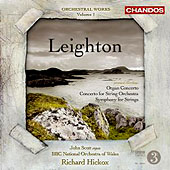
ESSENTIAL RECORDINGS

Kenneth Leighton was a British composer who lived from 1929 to 1988. He seems to have been quite adept at composing music for solo instruments, orchestral works, chamber and choral works, and is now one of the most respected and performed of all British composers. Most of the recordings available today are of his choral works. The three works on this new disc, released in May of 2008, are all world premiere recordings. Why it took so long for these amazing pieces to encounter microphones is beyond me. These are all substantial, powerful, well written compositions.
The symphony, written in 1949, is a youthful and lyrical work, full of pastoral images and jaunty rhythms, so typical of other pieces for string orchestras, which seems to have been a scoring of choice in England for a while, from the likes of Elgar, Vaughan Williams, Delius, Walton, Finzi and more.
Now jump ahead to 1970. What a difference 20 years makes in a man's outlook. This Concerto for Organ is a dark, dramatic and moving work, very similar in mood to the Copland organ symphony. It opens with a whisper, but with a long sustained crescendo and gradual development lasting more than 5 minutes, with some "check over your shoulder" moments, it builds to something quite impressive. You can tell that Leighton's head is now in atonality, but both his feet are firmly on the ground of romantic tradition. The dissonances are perfectly judged and add to the powerful effect. There is always great interplay between the organ and the strings, and the timpani are an integral part of the fabric, sometimes even sounding out important motifs, or creating the momentum that propels the work forward. The organist needs to exhibit his virtuosity near the end, where the cadenza calls for quite impressive solo organ declamations. It was recorded in St. David's Hall, in Cardiff, which has one of the largest pipe organs in Wales.
The final work on the disc, from 1961, for strings only, was definitely influenced by Shostakovich. It has, at the beginning, that same sense of bleak, cold desolation, so present in Shostakovich. And the opening of the last movement could very well be Shostakovich re-writing the first movement of his 5th symphony. All in all another powerful, full of substance piece of music.
Chandos have done it again. You could not possibly ask for a better recording for works like this, with the strings and organ always in perfect balance from the softest whispers to the loudest clashes. John Scott, Richard Hickox and the BBC orchestra have performed another winner that others in the future will be judged against.
In conclusion, I would end by recommending that any pipe organ fans, and those who love dark and challenging orchestral works, listen to the Concerto for Organ. It will make your day!
Jean-Yves Duperron